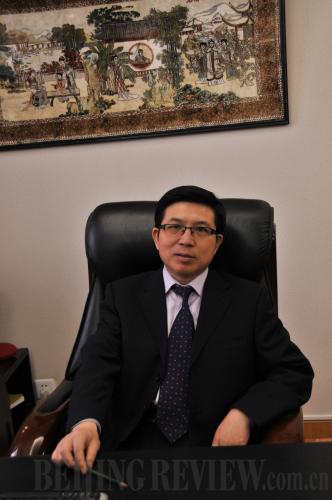|
 |
|
(SUN WENBIN) |
This year marks the 20th anniversary of China's diplomatic relations with Tajikistan, Uzbekistan, Kazakhstan, Kyrgyzstan and Turkmenistan. In an interview with Beijing Review, Fan Xianrong, Chinese Ambassador to Tajikistan, said the Sino-Tajik relationship has been growing rapidly and smoothly in the last 20 years with unprecedented progress in various fields. Excerpts of the interview follow:
Beijing Review: How do you appraise the overall relations between China and Tajikistan in the last two decades?
Fan Xianrong: On January 4, 1992, the two countries signed the joint communiqué on the establishment of diplomatic relations in Dushanbe. Since then, the Sino-Tajik relationship has entered a new era. The last 20 years have seen a swift development of the relationship.
Political mutual trust is growing all the time. Cooperation in economy, trade, transportation, telecommunications, agriculture, infrastructure construction, security and culture has made remarkable progress, which not only deepens the friendship of the two nations, but also brings them substantial benefits.
What is the basis for the stable relationship between the two countries?
As close neighbors, China and Tajikistan have wide common interests and huge potential for cooperation. Over the decades, the two governments have made unremitting efforts to lay a solid foundation for cooperation, and great achievements have been made.
Political mutual trust has been strengthened. Since the establishment of diplomatic ties, official visits have been frequent between the two countries. Personal friendship has also been established between the leaders of the two sides. For example, the deep personal friendship between President Hu Jintao and Tajik President Emomalii Rahmon has provided strong support for the smooth development of the relations. President Hu visited Tajikistan in 2008, while President Rahmon visited China five times from 1993 to 2007. Since 2003, the two leaders have also met for talks many times during international meetings such as Shanghai Cooperation Organization (SCO) summits.
The legal foundation for cementing Sino-Tajik bonds has been improved. In addition to the 1992 joint communiqué, the two countries have signed a series of important documents. In January 2007, during President Rahmon's visit to China, the two countries signed the Treaty of Good Neighborliness, Friendship and Cooperation, which became the highest achievement in their efforts to develop a legal framework for the Sino-Tajik relationship.
On January 14, 2011, Tajikistan's parliament ratified the border demarcation protocol between China and Tajikistan. The move showed the two countries' border issue had been completely settled. So far China and Tajikistan have signed more than 100 documents, providing a sound legal basis for the further progress of their relations.
| 